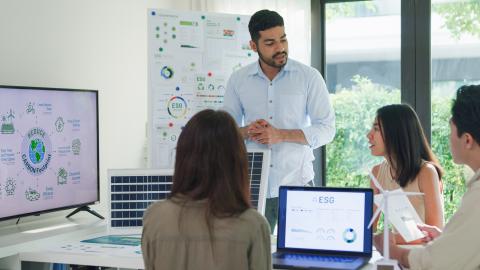Sponsored content: created in partnership with Duolingo.
Surveys show that Generation Z – the newest generation to join the workplace – favours sustainability and corporate social responsibility (CSR) over salary and other benefits. And while CSR has been around for decades, now more than ever students are seeking employers with solid ethical values, who are committed to action on the environment, and who consider their impact on all stakeholders, not just their shareholders.
The United Nations’ Sustainable Development Goals – an agenda aimed at achieving 17 stated ambitions by 2030 – have also increased the focus on CSR issues, with more countries adopting regulatory frameworks to nudge organisations into sustainable business practices.
It’s fertile ground for career opportunities, too. Graduates could consider direct roles in CSR departments, where they help businesses develop sustainable practices, report on their activities and engage with the community, or focus on positions with environmental impact, such as sustainability consultants or renewable energy specialists. There are also career paths in human rights organisations, non-profit organisations and social enterprises, or careers in public policy and government.
When it comes to preparing for a career in CSR, there are specific degrees and postgraduate qualifications students can consider. However, a number of degrees such as psychology, social sciences or economics would also build transferable skills. To make themselves stand out, students could consider volunteering for relevant organisations or gaining internships to build up their professional network. There are also professional associations, such as the International Association for Impact Assessment, that could be useful in building expertise and contacts.
What skills are required for a career in CSR?
Graduates embarking on a career in CSR should build a mix of soft skills, technical skills and intercultural competence, meaning they understand the role of global factors in sustainability.
Soft skills: CSR roles will often draw on empathy, communication and problem-solving. Many positions will require applicants to work with multiple stakeholders both inside and outside the business, including local communities and supply chains.
Technical skills: As sustainability becomes ever more complex, CSR teams will need employees with skills in data analysis, project management and specific technical knowledge of areas such as environmental science or human rights law.
What are the benefits of a career in CSR?
A career in CSR can offer a high level of personal fulfilment because it gives students the chance to make a positive contribution to the world. But it can also build a strong foundation for any number of careers in the future. These could include jobs in corporate affairs or lobbying, public relations and communications or supporting green investments or research. The soft skills gained in a CSR role also fit well into established functions such as human resources and diversity and inclusion.
Ultimately, students who follow a purpose-driven career are valuable to employers because they demonstrate they can make meaningful contributions, understand complex and fast-changing situations and are adaptable. Because CSR roles exist across many different industries, from tech to healthcare, there are many paths for graduates to consider.

Comments